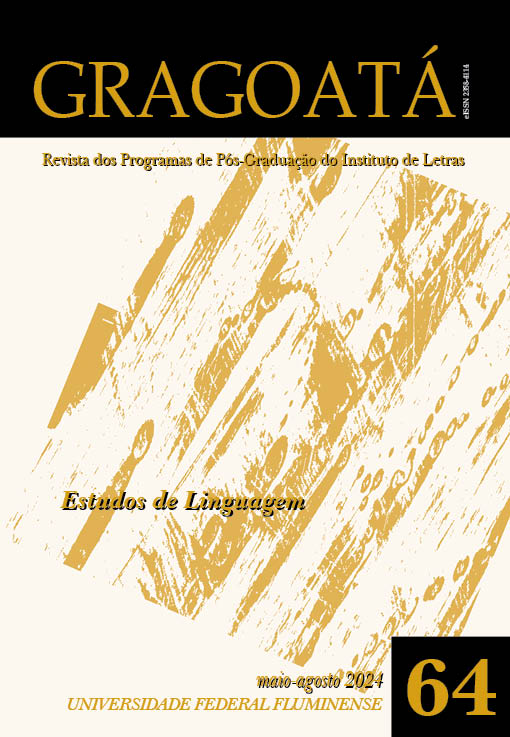Temporal interpretation of negative clauses in Karitiana
DOI:
https://doi.org/10.22409/gragoata.v29i64.60385.ptKeywords:
Interpretação Temporal, Negação, Karitiana, Metodologia, Análise SemânticaAbstract
This paper presents a study about temporal interpretation in negative clauses in Karitiana (ISO 639-3: ktn). Karitiana is a language of the Arikém family and Tupi stock (RODRIGUES, 1986, p. 46) and it has a future vs. non-future system (STORTO, 2002; MÜLLER; FERREIRA, 2020). Semantically, time is a relation between a topic time and the utterance time (KLEIN, 2013). This language expresses time through suffixes which are present in affirmative clauses, but absent in negative clauses (STORTO, 2018). Thus, our goal was to verify how temporal interpretation happens in negative environments in which tense is absent. Our hypothesis were: (i) that temporal interpretation is contextually determined or (ii) that temporal interpretation is determined grammatically by other factors. In order to test them, we elaborated a test in two steps: (i) Contextualized data elicitation of audios with a native speaker of negative clauses in the future and in the past and (ii) presenting the audios without the context to another native speaker so he could translate them. This test has shown that negative clauses without the appropriate context are interpreted in the non-future corroborating the second hypothesis. Data elicitation for semantic analysis is generally made using contexts (MATTHEWSON, 2004; SANCHEZ-MENDES, 2014). However, this test has shown that translation without a context can be an important methodological tool when one wishes to verify if there are grammatical mechanisms not salient to the linguist determining the interpretation.
Downloads
References
BURTON, Strang; MATTHEWSON, Lisa. Targeted Construction Storyboards in Semantic Fieldwork. In: BOCHNAK, Ryan; MATTHEWSON, Lisa (ed.). Methodologies in Semantic Fieldwork.. Oxford: Oxford University Press, 2015. p. 135-156.
COMRIE, Bernard. Tense. Cambridge textbooks in linguistics. Cambridge: Cambridge University Press, 1985.
DECAEN, Vincent. Tenseless languages in light of an aspectual parameter for Universal Grammar: A preliminary cross-linguistic survey. Toronto Working Papers in Linguistics, v. 14, p. 41-81, 1991.
FERREIRA, Luiz Fernando; MÜLLER, Ana. Fieldwork Techniques in Semantics. In: VANDER KLOK, Jozina; FERREIRA RECH, Núbia; GUESSER, Simone. Modality in Underdescribed Languages: Methods and Insights. Berlin, Boston: De Gruyter Mouton, 2022. p. 15-46.
KLEIN, Wolfgang. Time in language. Routledge, 2013.
LANDIN, David. An outline of the syntactic structure of Karitiana sentences. In: Estudos sobre línguas Tupi do Brasil. Brasília: Summer Institute of Linguistics, 1984. p. 219-254.
LOUIE, Meagan. The problem with NoNonsense Elicitation Plans for Semantic Fieldwork. In: BOCHNAK, Ryan M. & MATTHEWSON, Lisa (ed.). Methodologies in Semantic Fieldwork. Oxford: Oxford University Press, 2015. p. 47-71.
MATTHEWSON, Lisa. On the Methodology of Semantic Fieldwork. International Journal of American Linguistics, v. 70, p. 369-415, 2004.
MOSELEY, Christopher. Atlas of the World’s Languages in Danger. 3. ed. Paris: UNESCO Publishing, 2010.
MÜLLER, Ana; FERREIRA, Luiz Fernando. O sistema aspecto-temporal da língua Karitiana. Cadernos de Estudos Linguísticos, Campinas, v. 62, e020012, 2020a.
MÜLLER, Ana; FERREIRA, Luiz Fernando. Modo - O caso do Karitiana. Revista Letras, v. 101, p. 45-70, 2020b.
RODRIGUES, Aryon. Línguas Brasileiras: Para o conhecimento das línguas indígenas. São Paulo: Loyola, 1986.
SANCHEZ-MENDES, Luciana. Trabalho de campo para análise em semântica formal. Revista Letras, Curitiba, v. 90, p. 277-293, 2014.
SCHMITT, C.; MILLER, K. Using comprehension methods in language acquisition research. In: BLOM, E.; UNSWORTH, S. Experimental methods in language acquisition research. Amsterdam/Philadelphia: John Benjamins, 2010. v. 27. p. 35-56.
STORTO, Luciana. Aspects of a Karitiana Grammar. 1999. Tese (Doutorado em Filosofia) - Massachusetts Institute of Technology, Cambridge, 1999.
STORTO, Luciana. Algumas categorias funcionais em Karitiana. In: CABRAL, Ana Suely Arruda Câmara; RODRIGUES, Aryon D. Línguas indígenas brasileiras: Fonologia, gramática e história. Atas do I Encontro Internacional do Grupo de Trabalho sobre Línguas Indígenas da ANPOLL. Belém: EDUFPA, 2002. p. 151-164.
STORTO, Luciana. Negation in Karitiana. In: Wa7 xweysás i nqwalutteníha i ucwalmícwa: He loves the Peoples language: Essays in honour of Henry Davis. Vancouver: UBCOP, 2018. p. 227-240.
STORTO, Luciana; ROCHA, Ivan. Inventário sociolinguístico da Língua Karitiana. INDL - Inventário Nacional da Diversidade Linguística, IPHAN-MPEG, 2018.
Downloads
Published
How to Cite
Issue
Section
License
Copyright (c) 2024 Gragoatá

This work is licensed under a Creative Commons Attribution 4.0 International License.
Authors who publish in Gragoatá agree to the following terms:
The authors retain the rights and give the journal the right to the first publication, simultaneously subject to a Creative Commons license CC-BY-NC 4.0, which allows sharing by third parties with due mention to the author and the first publication by Gragoatá.
Authors may enter into additional and separate contractual arrangements for the non-exclusive distribution of the published version of the work (for example, posting it in an institutional repository or publishing it in a book), with recognition of its initial publication in Gragoatá.

Gragoatá is licensed under a Creative Commons - Attribution-NonCommercial 4.0 International.














